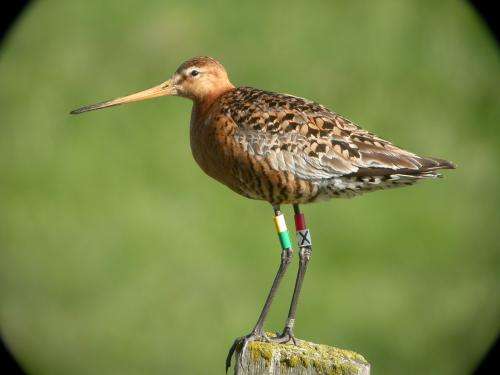Study reveals why timing of bird migration is changing

Researchers at the University of East Anglia have found out why birds are migrating earlier and earlier each year.
Experts have long suspected climate change is somehow driving this advancing migration pattern. But new research published today reveals that individual birds migrate like clockwork – arriving at the same time each year.
However, climate warming is resulting in earlier nesting and hatching earlier each year, and this appears to be linked to the advancing migration.
Lead researcher Dr Jenny Gill from UEA's school of Biological Sciences said: "We have known that birds are migrating earlier and earlier each year – particularly those that migrate over shorter distances. But the reason why has puzzled bird experts for years. It's a particularly important question because the species which are not migrating earlier are declining in numbers."
The research team looked at a population of Icelandic black-tailed godwits over 20 years. During this time period, the flock advanced their spring arrival date by two weeks.
"The obvious answer would be that individual birds are simply migrating earlier each year. But our tracking of individual birds shows that this is not the case. In fact individual birds do almost exactly the same thing every year – arriving punctually at the same time year-on-year."
The team went on to investigate what could be causing the overall arrival time of godwits to creep forward.
"Because we have been following the same birds for so many years, we know the exact ages of many of them.
"We found that birds hatched in the late 1990s arrived in May, but those hatched in more recent years are tending to arrive in April. So the arrival dates are advancing because the new youngsters are migrating earlier.
"Climate change is likely to be driving this change because godwits nest earlier in warmer years, and birds that hatch earlier will have more time to gain the body condition needed for migration and to find good places to spend the winter, which can help them to return early to Iceland when they come back to breed."
This can also explain why advances in migration timing are not common among species migrating over long distances. "Many long-distance migrants arrive so late on the breeding grounds that they have little opportunity to respond to warming conditions by nesting earlier."
"This research is very important because many long-distance migrant bird populations are currently declining very rapidly, and identifying how climate change is affecting these populations is a key part of understanding the causes of these declines."
Provided by University of East Anglia

















